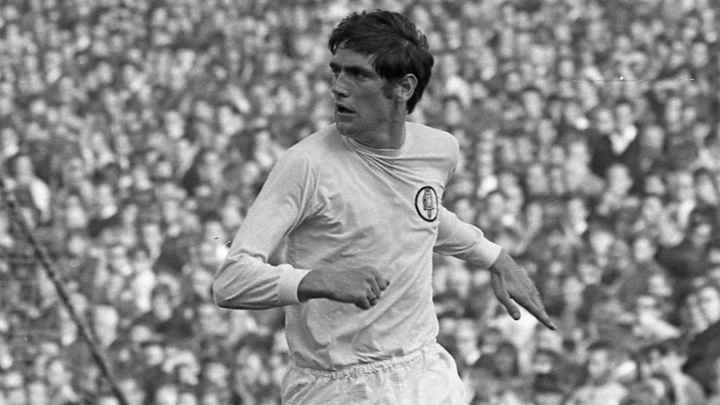'Bites Yer Legs' Didn't Tell the Whole Story of Leeds Great Norman Hunter

Long after he’d retired from playing football, Norman Hunter’s name lingered as a bogeyman. He had, after all, attracted the nickname “Bites Yer Legs” even in the notably violent era of the 1960s and early 70s, and even in a notably aggressive Leeds United side. This was not wholly fair for Hunter, who died on Friday at the age of 76 having tested positive for the coronavirus, as he was also a very fine footballer.
Don Revie had been manager of Leeds for a little over a year when, in September 1962, he gave a debut to Hunter alongside Jack Charlton at center back away at Swansea Town. Leeds won 2-0 and a defensive partnership that would endure for a decade was born. Leeds was promoted the following season and soon established itself as one of the finest sides not only in England but in Europe. That it won only two league titles and one FA Cup before Revie took over for Alf Ramsey as England manager in 1974 was a matter of extraordinary misfortune–and, perhaps, a sense that Revie’s obsessive, anxious, superstitious character counted against his sides in the biggest games: they lost in six major finals in that time.
Hunter had been something of a project of Revie’s. He was born in Eighton Banks in Gateshead, around 30 miles north of Revie’s own birthplace in Middlesbrough. He dreamed of playing for Newcastle United, but when Leeds offered him a contract as a 15-year-old, he gave up his job as an electrical fitter to accept. Although Hunter's ball-playing ability was not in doubt, Revie doubted his physicality and made hm drink a mixture of raw eggs and sherry every morning. Six weeks short of Hunter's 20th birthday, Revie decided he was ready.
Hunter’s partnership with Charlton was a classic pairing of complementary types. Charlton was tall and gangling, Hunter shorter with a better touch. Neither took many prisoners. A decade earlier, Hunter might have been a tough wing-half, and there were occasions when he operated in midfield, particularly for England. He was included in England’s 1966 World Cup-winning squad and again in its 1970 World Cup team, but he realistically was never going to displace Bobby Moore, who performed a similar role alongside Charlton, although with rather less aggression.
In total, Hunter played 28 times for England, an international career overshadowed by the uncharacteristically tentative challenge that led, after a Peter Shilton mistake, to Poland’s goal at Wembley in the crucial final qualifier for the 1974 World Cup. Needing to win, England could only draw 1-1 and so for the first time failed to qualify for a World Cup.
The "Bites Yer Legs" nickname, which Hunter never liked–feeling it prejudiced referees, pundits and opponents against him–stemmed from a banner in the crowd at the 1972 FA Cup final in which he excelled as Leeds beat Arsenal. That he was uncompromising cannot be disputed, but this was an age in which almost every side had a hardman–notoriously tough players–usually with a nickname to go with it.
A year later, Hunter was sent off in the final minute as Leeds lost 1-0 to AC Milan in the final of the Cup-Winners’ Cup, riled by a dismal performance by the Greek referee Christos Michas. Locals in Athens and Leeds fans joined in pelting the victorious team with projectiles as they performed a lap of honor, such had been Michas’s perceived bias in the Italian club’s favor. Michas was subsequently banned for life for match-fixing, although nothing was ever proven about that final.
Hunter’s other experience of a European final was similar as Leeds was beaten 2-0 by Bayern Munich in Paris in the European Cup 1975 amid more dubious refereeing. This time, dissatisfaction erupted into a full-blown riot that led to Leeds being banned from the competition for four years, reduced to two on appeal. The punishment was largely academic. Leeds, by then under Jimmy Armfield, was well past its best. Hunter left the following year after 540 league games for the club (and 726 appearances in 14 years overall), joining Bristol City before winding down his career at Barnsley, where he took over as manager in 1980. He led Barnsley to promotion to the Second Division, but that was his only real success in management.
"He leaves a huge hole in the Leeds United family, his legacy will never be forgotten and our thoughts are with Norman’s family and friends at this very difficult time," Leeds wrote in a statement on Friday.
Off the pitch, he was a warm and genial storyteller, a personality far removed from his on-field reputation, and a regular on the after-dinner circuit and summarizing in local radio. His playing career was oddly dominated by near-misses and what-might-have-beens but it says much for how good Revie’s Leeds was that it still collected so much silverware.
Of all the era’s hardmen, Hunter was probably the best footballer.

An accomplished author of multiple books, Jonathan Wilson is one of the world’s preeminent minds on soccer tactics and history.